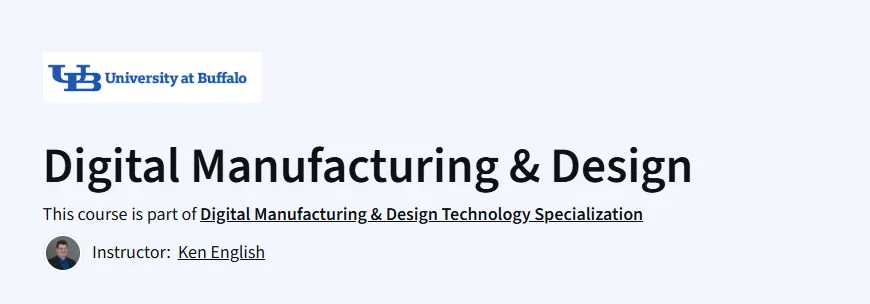What will you learn in Digital Manufacturing & Design Course
Understand the impact and principles of digital manufacturing and design (DM&D).
Explore how Industry 4.0 is transforming manufacturing processes.
Gain insights into cyber-physical systems, IoT, and cloud-based design.
Learn how to integrate digital technologies across the product lifecycle.
Program Overview
Module 1: Introduction to Digital Manufacturing
⏱️ 1 week
Topics: Evolution of manufacturing, core concepts of digital transformation.
Hands-on: Reflective activity on traditional vs. digital processes.
Module 2: Digital Thread and Digital Twin
⏱️ 1 week
Topics: Definitions, implementation strategies, and value creation.
Hands-on: Conceptual exercises around data continuity in design to production.
Module 3: Cyber-Physical Systems
⏱️ 1 week
Topics: How machines and software interact in smart factories.
Hands-on: Virtual lab tour and basic interaction with digital equipment models.
Module 4: Data Management and Connectivity
⏱️ 1 week
Topics: Industrial IoT, real-time data collection, analytics for efficiency.
Hands-on: Scenarios for optimizing workflows with real-time insights.
Module 5: Digital Manufacturing Applications
⏱️ 1 week
Topics: Additive manufacturing, robotics, automation case studies.
Hands-on: Industry interviews and interactive problem-solving tasks.
Get certificate
Job Outlook
High demand in smart manufacturing, Industry 4.0 consulting, and automation roles.
Roles include digital manufacturing engineer, systems integrator, and data analyst in production environments.
Growing relevance in automotive, aerospace, and consumer goods sectors.
Strong alignment with CAD/CAM, IIoT, and production optimization careers.
Specification: Digital Manufacturing & Design
|
FAQs
- No prior CAD knowledge is necessary.
- Course explains concepts without relying on software mastery.
- Focuses more on digital manufacturing principles than tool training.
- Helpful but not mandatory to know basics of design.
- Advanced CAD learning can be pursued after completion.
- Builds a foundation in IoT, digital twins, and cyber-physical systems.
- Useful for roles like systems integrator, process analyst, and smart factory engineer.
- Provides insights relevant to automotive, aerospace, and consumer goods.
- Strengthens understanding needed for automation consulting.
- Acts as a stepping stone to advanced Industry 4.0 certifications.
- Course includes virtual labs and industry case studies.
- Interactive exercises simulate digital workflows.
- Not a replacement for full software certification (e.g., Siemens NX, AutoCAD).
- Provides conceptual readiness for tool-specific training.
- Focuses on systems thinking rather than software mechanics.
- Content is beginner-friendly and avoids heavy math.
- Explains digital transformation in simple terms.
- Useful for managers overseeing smart factory projects.
- Builds cross-functional understanding of design to production.
- Helps non-engineers communicate with technical teams effectively.
- Traditional automation focuses on machine operation and robotics.
- Digital manufacturing emphasizes integration of data, design, and IoT.
- Introduces the concept of digital thread and digital twin.
- Covers full lifecycle from product design to factory floor.
- Prepares learners for broader system-level thinking in manufacturing.





